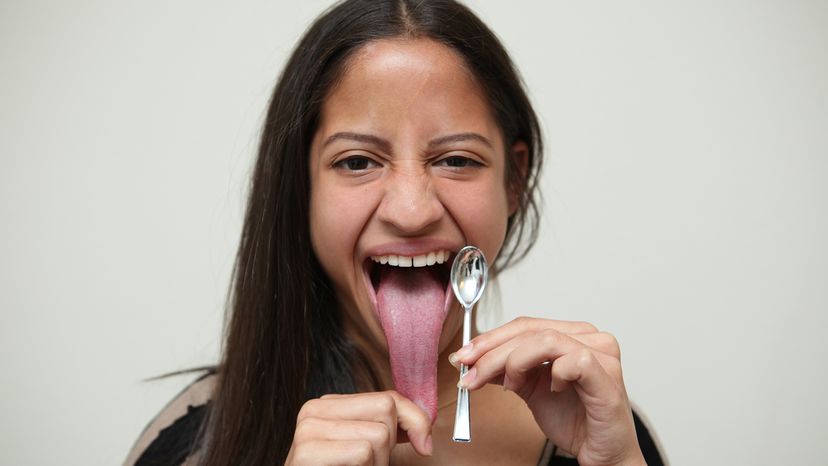 “Gerkary Bracho Blequett may not be able to taste her own tongue, but she can touch her elbow, her earlobe and her eye by stretching out her 4.48-inch (11.38 centimeter) tongue. Blequett did not hold the Guinness World Record for the world’s longest tongue at the time of publication. Barcroft Images/Barcroft Media via Getty Images
“Gerkary Bracho Blequett may not be able to taste her own tongue, but she can touch her elbow, her earlobe and her eye by stretching out her 4.48-inch (11.38 centimeter) tongue. Blequett did not hold the Guinness World Record for the world’s longest tongue at the time of publication. Barcroft Images/Barcroft Media via Getty Images
It may seem like a ridiculous question at first, but it’s actually a mindbender. Thirteenth-century Indian mystic Dnyaneshwar even used it in contemplation of the very nature of being. Along with its fellow sense organs of ears, eyes, nose and skin, the tongue serves as one of the primary ways we experience the world and form a working model of it.
The same riddle is frequently applied to the eye, though we can certainly see our own eyes in reflection. We can feel our own skin, though certainly the tip of your left index finger can’t touch itself. The ear certainly can’t hear itself, but neither does it make a sound. The tongue, however, lurks in our mouth like a laired beast, flip-flopping its way through our daily conversation, tasting our food and occasionally dislodging a little of it from our teeth.
Perhaps we’re more inclined to ponder the mystery of the tongue due to its hidden nature or the many lingering myths regarding its functionality. Tongue rolling, for instance, is not the simple genetic trait that we often chalk it up to be. Nor is the tongue our strongest muscle (and while we’re at it, it’s a collection of muscles). Neither is the tongue laid out like a simple map, with different zones for sweet, salty, sour and bitter. One of the biggest misconceptions about the tongue, however, is that it rules alone in its governance of flavor sensations.
The receptor cells in our taste buds certainly carry out the chemical sensation of taste, but they’re located on the bumpy external surface of our tongue. They’re not able to turn those powers inward on themselves. They collect tactile and thermal details about any morsel that enters their domain. But the brain also depends upon your sense of smell to interpret flavor, so the tongue isn’t alone in its taste mission.
Your tongue certainly can taste food or the remnants of food in your mouth. Accidentally bite your tongue, and you can taste the blood trickling out of its own wound. (Fun fact: All that saliva and those blood vessels in your mouth seem to allow for quick healing.) You can also taste your own saliva, and who hasn’t had a bad taste in their mouth, whether from some aggressive garlic or an underlying medical condition? And yes, lovebirds, you can pick up on all these sensations during an open-mouth kiss, but you’ll still find yourself at pains to taste an actual living tongue.
Psychologists also talk about the concept of habituation, or the idea that if a stimulus is presented often enough or long enough we learn to ignore it, like the scent you spritz on before you leave the house that everyone but you can still smell later on in the day. The inability to taste our tongues could be an example of that phenomenon, but tongue experts were strangely silent when we reached out for answers.
In any case, we may not be able to taste our tongues for several reasons, but don’t let that stand in the way of a little mystic naval gazing.
Now That’s Interesting
The tongue never sleeps! It’s constantly moving, getting saliva where it needs to be.





























